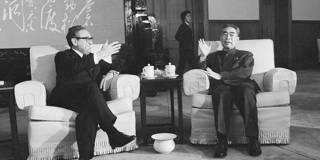After the late Henry Kissinger orchestrated the US “opening to China,” that country’s gradual embrace of economic reforms succeeded in making it the world’s second-largest economy. But the story did not end well for American workers, who would be ill-served by the continuation of Kissingerian realpolitik under Donald Trump.
BOSTON – Even harsh critics of Henry Kissinger concede that US President Richard Nixon’s visit to China in 1972 changed geopolitics forever. Before Kissinger orchestrated that diplomatic opening, American leaders framed the world as “capitalism vs. communism,” and anyone with communist friends was liable to be labeled a dangerous “Red.” After Kissinger, undiluted Communist Party of China control was allowed to thrive within the global market system.
Yet lost amid the celebration of China’s economic “success” were the costs of Kissinger’s China strategy both in the United States and around the world. If Donald Trump becomes president again in early 2025, that strategy will likely prevail, but in a more dangerous form.
For decades, Kissinger was an outspoken advocate for doing business with China, and he made good money by opening doors there. Among other things, this meant lending Deng Xiaoping his support after the massacre of peaceful protesters in Tiananmen Square on June 4, 1989. Less than two months later, Kissinger famously wrote:

BOSTON – Even harsh critics of Henry Kissinger concede that US President Richard Nixon’s visit to China in 1972 changed geopolitics forever. Before Kissinger orchestrated that diplomatic opening, American leaders framed the world as “capitalism vs. communism,” and anyone with communist friends was liable to be labeled a dangerous “Red.” After Kissinger, undiluted Communist Party of China control was allowed to thrive within the global market system.
Yet lost amid the celebration of China’s economic “success” were the costs of Kissinger’s China strategy both in the United States and around the world. If Donald Trump becomes president again in early 2025, that strategy will likely prevail, but in a more dangerous form.
For decades, Kissinger was an outspoken advocate for doing business with China, and he made good money by opening doors there. Among other things, this meant lending Deng Xiaoping his support after the massacre of peaceful protesters in Tiananmen Square on June 4, 1989. Less than two months later, Kissinger famously wrote: